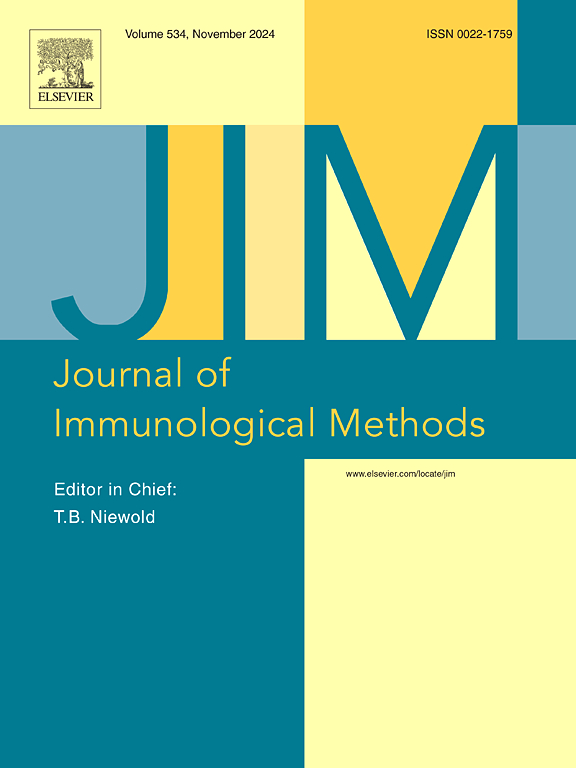Development of a chimeric monoclonal antibody as a potential diagnostic reference in PR3-ANCA detection
IF 1.6
4区 医学
Q4 BIOCHEMICAL RESEARCH METHODS
引用次数: 0
Abstract
Background
The quantification of antineutrophil cytoplasmic antibodies (ANCA) against proteinase 3 (PR3) is crucial for diagnosing and monitoring granulomatosis with polyangiitis (GPA). However, a standardized and widely available quantitative reference material for PR3-ANCA detection remains lacking.
Objective
This study aims to develop and evaluate the properties of a novel chimeric human-mouse PR3 monoclonal antibody as a potential quantitative reference for PR3-ANCA detection using various in vitro diagnostic methods.
Methods
Mouse monoclonal antibodies were screened from hybridoma cells derived from mice immunized with recombinant human PR3 (rPR3). A high-affinity monoclonal antibody (A07) was sequenced, and a chimeric antibody incorporating human IgG1 constant regions was produced using a mammalian cell expression system. The antibody's binding to PR3 and its applicability in indirect immunofluorescence (IIF) assay, line-blotting, enzyme-linked immunosorbent assay (ELISA), and chemiluminescence immunoassay (CLIA) were analyzed.
Results
The chimeric A07 antibody recognized the conformational epitopes with high affinity for only non-denatured PR3 and demonstrated the correct cytoplasmic staining pattern in IIF. Line-blotting assays confirmed its specificity and potency. ELISA and CLIA experiments showed well-defined standard curves, with the chimeric antibody displaying consistent reactivity comparable to native PR3-ANCA in serum samples across different antigen conditions.
Conclusions
These findings indicate that the chimeric A07 antibody effectively recognizes both recombinant and native PR3 antigens and can be applied across multiple in vitro PR3-ANCA assays. Furthermore, this antibody may serve as a standard reference for determining serum PR3-ANCA titers or as a substitute for PR3-positive serum in diagnostic applications.
一种用于PR3-ANCA检测的嵌合单克隆抗体的研制。
背景:定量检测针对蛋白酶3 (PR3)的抗中性粒细胞胞浆抗体(ANCA)对多血管炎肉芽肿病(GPA)的诊断和监测至关重要。然而,PR3-ANCA检测的标准化和广泛可用的定量参考材料仍然缺乏。目的:制备并评价一种新型嵌合人鼠PR3单克隆抗体的性质,为多种体外诊断方法检测PR3- anca提供潜在的定量参考。方法:从重组人PR3 (rPR3)免疫小鼠杂交瘤细胞中筛选小鼠单克隆抗体。测定了高亲和单克隆抗体(A07)的序列,并利用哺乳动物细胞表达系统制备了含人IgG1恒定区嵌合抗体。分析该抗体与PR3的结合情况及其在间接免疫荧光(IIF)法、线印迹法、酶联免疫吸附法(ELISA)和化学发光免疫分析法(CLIA)中的适用性。结果:嵌合抗体A07仅识别非变性PR3的高亲和力构象表位,并在IIF中显示正确的细胞质染色模式。行印迹试验证实了其特异性和效力。ELISA和CLIA实验显示了明确的标准曲线,嵌合抗体在不同抗原条件下的血清样品中具有与天然PR3-ANCA相当的一致反应性。结论:嵌合抗体A07能有效识别重组PR3抗原和原生PR3抗原,可用于多种体外PR3- anca检测。此外,该抗体可作为测定血清PR3-ANCA滴度的标准参考,或在诊断应用中替代pr3阳性血清。
本文章由计算机程序翻译,如有差异,请以英文原文为准。
求助全文
约1分钟内获得全文
求助全文
来源期刊
CiteScore
4.10
自引率
0.00%
发文量
120
审稿时长
3 months
期刊介绍:
The Journal of Immunological Methods is devoted to covering techniques for: (1) Quantitating and detecting antibodies and/or antigens. (2) Purifying immunoglobulins, lymphokines and other molecules of the immune system. (3) Isolating antigens and other substances important in immunological processes. (4) Labelling antigens and antibodies. (5) Localizing antigens and/or antibodies in tissues and cells. (6) Detecting, and fractionating immunocompetent cells. (7) Assaying for cellular immunity. (8) Documenting cell-cell interactions. (9) Initiating immunity and unresponsiveness. (10) Transplanting tissues. (11) Studying items closely related to immunity such as complement, reticuloendothelial system and others. (12) Molecular techniques for studying immune cells and their receptors. (13) Imaging of the immune system. (14) Methods for production or their fragments in eukaryotic and prokaryotic cells.
In addition the journal will publish articles on novel methods for analysing the organization, structure and expression of genes for immunologically important molecules such as immunoglobulins, T cell receptors and accessory molecules involved in antigen recognition, processing and presentation. Submitted full length manuscripts should describe new methods of broad applicability to immunology and not simply the application of an established method to a particular substance - although papers describing such applications may be considered for publication as a short Technical Note. Review articles will also be published by the Journal of Immunological Methods. In general these manuscripts are by solicitation however anyone interested in submitting a review can contact the Reviews Editor and provide an outline of the proposed review.

 求助内容:
求助内容: 应助结果提醒方式:
应助结果提醒方式:


